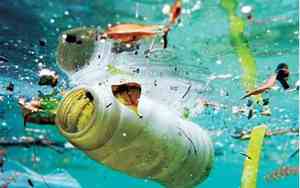
海洋污染是当今世界面临的重大环境问题之一,其危害深远且广泛。作文如下:
海洋污染的警钟——我们的蓝色家园在哭泣
在浩渺的大海中,曾是生命繁衍的乐园,如今却笼罩在一层厚重的污染之下。海洋污染,就像一把无形的剑,刺破了蓝色的宁静,威胁着地球生态的平衡。
塑料垃圾是海洋污染的头号杀手。无数的塑料袋、瓶子和渔网在海风中飘荡,形成被称为“塑料岛”的恶劣现象。这些塑料不仅难以降解,还会被海洋生物误食,导致死亡,破坏食物链的稳定性。
石油泄露对海洋生态的影响更是致命。一旦发生油船事故,大片海域会被石油覆盖,海洋生物的生存环境遭到破坏,甚至直接中毒或窒息。
再者,化学废物的排放使得海洋酸化,这对珊瑚礁等生物构成了严重威胁。珊瑚礁是海洋生物的生存天堂,酸性的海水使得它们难以形成,生物多样性受到严重挑战。
海洋污染还影响全球气候。海水吸收大量的二氧化碳,污染加剧可能减弱它的吸碳能力,加剧全球变暖。
面对这些危害,我们不能坐视不管。保护海洋,就是保护我们自己。每个人都应参与其中,减少塑料使用,提倡环保生活方式,同时呼吁政府和企业加强污染治理,共同守护那一片蔚蓝。
海洋污染的恶果警示我们,保护海洋环境,刻不容缓。让我们携手,为海洋的清洁和生物的生存而努力,让蓝色的海洋重获生机。
海洋污染涉及多个方面,其危害主要体现在以下几个方面:
1. 生态破坏:大量的废弃物,如塑料、废弃船只、有毒化学物质等,沉入海底,破坏了海洋生物的生存环境。例如,塑料微粒会被浮游生物误食,形成“食物链”上的恶性循环,影响生物多样性。
2. 水生生物死亡:有毒物质如石油、重金属等泄漏到海水中,直接或间接导致鱼类、贝类等的死亡,破坏海洋食物链,可能引发海洋生物种群的衰退。
3. 海洋酸化:人类活动产生的二氧化碳大量溶解在海水中,形成碳酸,导致海洋酸化,威胁依靠碳酸钙贝壳的海洋生物,如珊瑚和贝类。
4. 气候变化:海洋吸收大量二氧化碳,酸化会削弱其吸收二氧化碳的能力。同时,海平面上升是冰川融化和热膨胀双重效应的结果,海洋污染加剧了这种气候变化。
5. 经济影响:海洋污染影响了海洋渔业,减少了渔民的收益,并且旅游业也因海滩污染和海洋生物死亡而受损。
6. 健康风险:对于人类来说,食用受污染的海鲜可能引入有害化学物质,影响人类健康。
海洋污染对海洋生态系统、生物多样性、气候、经济以及人类健康都产生了深远影响,需要我们积极采取措施进行预防和治理。
The harmful impacts of ocean pollution are multi-faceted and encompass various aspects in English. Here's a brief overview:
1. Ecosystem damage: An excessive amount of waste, like plastics, oil spills, and toxic chemicals, disrupts the marine ecosystem. Marine organisms, such as fish and shellfish, lose their habitats, leading to imbalances in the food chain.
2. Aquatic life endangered: Poisonous substances like oil and heavy metals pose a direct threat to marine life, causing death or illness, and ultimately threatening populations of marine species.
3. Ocean acidification: Increased atmospheric CO2 dissolves in seawater, causing a decrease in pH, which is harmful to organisms with calcium carbonate shells, like coral reefs and shellfish.
4. Climate change: The ocean's ability to absorb carbon dioxide is reduced due to pollution, contributing to global warming and accelerated sea-level rise.
5. Economic consequences: The fishing industry and coastal tourism suffer, as pollution contaminates fishing grounds and renders beaches less attractive to visitors.
6. Human health risks: Consumption of contaminated seafood can expose humans to harmful chemicals, posing risks to their health.
In conclusion, ocean pollution poses a grave threat to both the natural world and human well-being, necessitating urgent global action to mitigate its effects.
Title: The Havoc of Ocean Pollution: A Call for Action
In the vast expanse of our planet, the oceans have long been a source of life and sustenance. However, the |[Waves of pollution] cast a damaging shadow, threatening not just marine ecosystems but the health and survival of millions of species, including our own. This essay delves into the profound impacts of ocean pollution on our environment and what must be done to preserve the ocean's health.
1. Ecosystem devastation: The accumulation of plastic waste, chemicals, and abandoned ships creates a toxic environment, devastating marine habitats and disrupting the delicate balance of the food chain. Sea creatures, such as turtles and marine mammals, mistake plastic for food, leading to fatal health consequences.
2. Aquatic life in peril: Oil spills and toxic spills are a lethal cocktail for marine life. Not only do they suffocate organisms, but also contaminate breeding grounds, leading to population declines and potential extinction.
3. Ocean acidification: The rising level of carbon dioxide in the atmosphere leads to increased ocean acidity. This acidification is devastating to organisms like coral reefs, the undersea forests that serve as crucial ecosystems.
4. Climate change accelerator: The ocean's role as a carbon sink is compromised by pollution, exacerbating global warming and contributing to rising sea levels.
5. Economic consequences: The fishing industry and tourism are hit hard, with contaminated seafood its way to markets and polluted beaches deterring tourists.
6. Human health risks: Consuming contaminated seafood can lead to illnesses due to the presence of heavy metals and toxins, causing long-term health issues.
The time for action is now. We must recognize our responsibility as global citizens and work together to reduce pollution, promote recycling, and enforce stricter regulations. Education, innovation, and collective efforts are paramount in reversing the damage already done and ensuring the health and prosperity of our oceans for generations to come. The ocean's well-being is intertwined with our own, and it's time to act before it's too late.
Remember, "Every drop counts, every plankton matters". Let's make a pledge to preserve the blue planet before it's too late.
海洋污染是当今地球面临的一大环境挑战,它对海洋生态系统和人类生活产生了深远影响。以下是一些主要的危害和相应的治理措施:
1. 生态系统破坏:过多的塑料、油污、有毒化学物质等污染物质进入海洋,破坏海底生态环境,威胁海洋生物的生存。
2. 食物链破坏:塑料微粒会被生物误食,进入食物链,影响整个海洋生态系统的稳定。
3. 海洋生物死亡与种群减少:污染直接导致海洋生物死亡,比如经过石油泄漏事件,大批鱼类和海洋生物无法抵抗有毒物质。
4. 海洋酸化:二氧化碳溶解在海水中,引发海洋酸化,对依赖碳酸钙的生物,如珊瑚和贝类,构成生存威胁。
5. 气候变化:海洋吸收大量二氧化碳,污染加剧可能减弱其吸碳能力,加剧全球气候变化。
1. 减少污染源:限制塑料制品的生产和使用,提高废弃物的回收利用,严格化工企业排污监管。
2. 清理海滩和海洋污染物:定期进行海滩和海洋的清理活动,如海滩清洁日,清除塑料垃圾。
3. 设限和监管:制定严格的海洋环境保护法规,严厉打击非法排污和倾倒垃圾的行为。
4. 科学研究与技术应用:发展和使用更环保的清洁能源,减少碳排放,研究更有效的污染物净化技术。
5. 教育和公众参与:提高公众的环保意识,鼓励参与海洋保护活动,培养绿色生活方式。
6. 国际协作:海洋污染是全球性问题,需要各国合作,共同应对,如签署和执行国际海洋保护协议。
海洋污染治理是一项长期且复杂的任务,需要全社会的共同努力和持续关注。
copyright © 2022 一生命运网 版权所有 辽ICP备2022007116号-4
法律声明:本站文章来自网友投稿,不代表本站观点,版权归原创者所有,如果侵犯了你的权益,请通知我们,我们会及时删除侵权内容!
